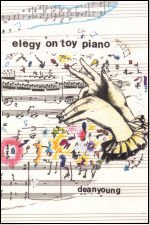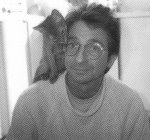Book report: Dean Young
 I just finished Dean Young’s latest, elegy on toy piano (2005). It follows in the spirit of Skid, a book I highly recommend to anyone and everyone.
I just finished Dean Young’s latest, elegy on toy piano (2005). It follows in the spirit of Skid, a book I highly recommend to anyone and everyone. Tony Hoagland (DY’s close friend) has an essay in the March issue of Poetry about experimental poets, the struggle against the confines of a narrative, and how today’s poets are trying to reflect the world by being elusive and cryptic.
He doesn’t mean difficult, because the examples he cites are funny, enjoyable, though opaque and non-narrative. And so, I kept thinking of Young while reading the essay. You’d be hard pressed to summarize the dramatic situation in a Young poem. They seldom have things like place and story. But that’s not to say they’re avant garde, snobbish, convoluted messes (though they are, sometimes, messes).
Young is majestically cowering from the world. In one poem, he writes, “What if everyone’s combined into one big poem / and I’m stuck with a preposition?”
He follows metaphors into new situations like he has severe ADHD. Take this: “Your lover love another, your father / thinks he’s still a flyer, no one likes / your novel and even you don’t like / your novel. So farewell, / or should that be hello? I can’t say / I’m afraid of death but I can’t say / I’m less afraid of living, / both go on whatever we do like fungus, / which, I must admit, gives me pause.”
or this: “First I will learn the polysyllabic latinate term / so my job can be immediately impressive / for being un-understandable.”
or this: “I can’t find the anvil / but then “I can’t find the anvil” / turns out to be some kind of joke / at the peach farm ... Walking through the trees -- / how different from looking for a Ph.D. / Yet also not. One good thing about / being unable to sit beside you / is seeing the back of your head in the leaves. / How far we are from kissing / our damage deposit goodbye.”
 There’s a clever poem called “True/False” which is a numbered list of statements. Some of the highlights are: “12. There are too many stars.” and “14. I intentionally miss belt loops so no one thinks I’m too involved in appearances.” and “43. Everyone should study history because the present is too complicated and no one knows a fucking thing about the future.”
There’s a clever poem called “True/False” which is a numbered list of statements. Some of the highlights are: “12. There are too many stars.” and “14. I intentionally miss belt loops so no one thinks I’m too involved in appearances.” and “43. Everyone should study history because the present is too complicated and no one knows a fucking thing about the future.”Young clearly falls into the school of poets Hoagland is discussing. His speaker remains aloof and distant, then jumps back in with something honest and powerful. He avoids linear storytelling in all its forms, and instead his poems are composed of fragments that indicate story, but never stick with a topic long enough to develop a narrative.
This could be incredibly frustrating, as a reader, but fortunately, Young’s poems are fun. He combines a childish temperament with a maturity of thought that ends up being stimulating and a good time.





0 Comments:
Post a Comment
<< Home